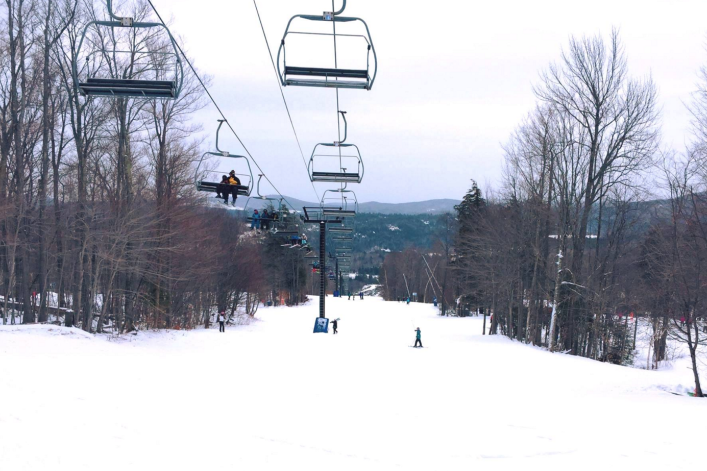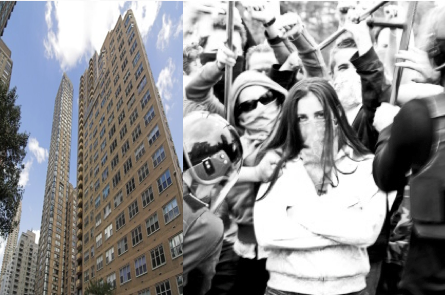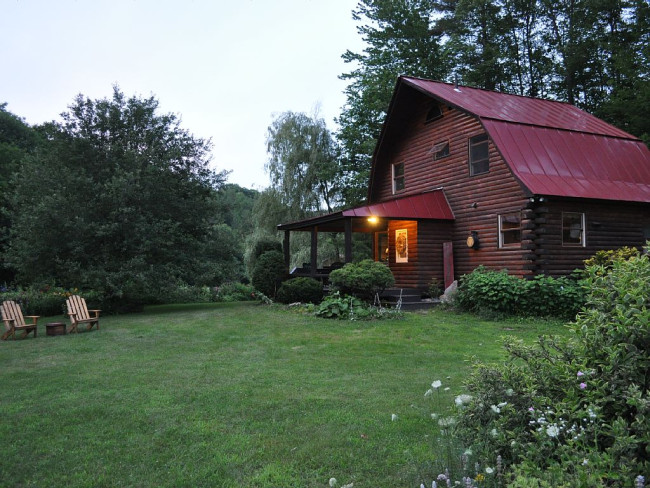The pros and cons of buying a ski home

A ski run at Okemo Mountain in Ludlow, Vermont.
S. Jhoanna Robledo
Full disclosure: Right now may not be the best time to get the biggest deal on a ski condo. As is often the case with many vacation homes, buying at the beginning or just before the peak season—in late fall when anticipation is high for snow-season fun, or in early January when the slopes are full—usually means more competition and less opportunity to negotiate. But since ski season is around the corner, and you may be researching pricey winter vacation rentals, now may be as good a time as any to look at your more permanent options.
And as with most real estate matters, deciding if you ought to buy in the first place doesn't depend merely on the weather. Here's what else to consider:
[Note: This story was originally published in March 2016 and updated in October 2017.]
Ski condo or ski house?
To be clear: There's not much difference between a ski house and a typical vacation getaway except for location. Ski houses are generally on or near mountains that have ski resorts, and are often chalets, which are structures with steep roof lines that go past the walls, enabling rain and snow to fall off the sides easily. This is very useful in areas that get tons of snow. Real estate website Moving Mountains has more information on chalets here.
With ski houses, as with typical houses, you're in charge of all the upkeep yourself, including what's beyond the home's four walls: snow removal, yard work, and trash removal, all of which add to the usual expenses of your mortgage and property taxes. You could, of course, clear the snow and landscape your yard all on your own.
Ski condos, on the other hand, are part of what's known as associations—they're similar to co-ops in the city. Property owners are charged condo association fees (akin to maintenance charges), which typically cover external upkeep.
"The people who own it don't have to cut grass, don't have to worry about snow plowing or snow shoveling, [and do] no exterior painting," says Wayne Bunce of Bunce Realty, a real estate firm in the Windham, New York area, site of Windham Mountain. "That's all part of the association fees."
Association dues usually run in the hundreds of dollars. Sometimes the amount is pegged to the size of the unit, and other times, they're all the same. Often, condos—which are usually either multi-floor townhouses or one-floor apartments—come with shared amenities, such as a pool, clubhouse, or a tennis court.

Buying for yourself or investment purposes?
It's also important to figure out how often you'll be using your ski home, Bunce says.
"Are you planning to spend time throughout the year, or are you just skiers?" he asks. "If you're just skiers, I say get a condo."
But if, like many New Yorkers, you dream of owning a spread where you can experience a more rural existence, a house with some acreage may be a better fit.
"If you want to spend time here in the summer or spring, you probably should get a house so you can enjoy the scenery with some trees and woods and views, and you won't feel like there's someone next to you," he says.
Whether or not you have dreams of playing short-term landlord will also shape your buying plans. If you plan to rent out your ski home on AirBnB, VRBO or HomeAway, the closer to the mountain, and then to civilization, the better.
"If the goal is to rent the unit, you would want the area to be busy and accessible to large demographics," says Alison Cummings, managing broker at TPW Real Estate in Stratton, Vermont. "Stratton is popular because of its location within a three-and-a-half-hour drive from a lot of metropolitan areas. There’s also a lot to do here if you’re not skiing."
Stratton and Okemo (another ski resort in nearby Ludlow, Vermont), for instance, are 30 minutes from Manchester, Vermont, a major destination for outlet shopping and historic sites such as Hildene, the estate of Abraham Lincoln's son, Robert Todd Lincoln, as well as lakes and summer camps. Such attractions are likely to lure vacationers in warmer months, too, opening up possibilities for rental income year-round.
If buying outright—and the cash outlay that comes with it—seems daunting, you may want to think about fractional ownership, better known as timeshares. Many ski resorts (such as Okemo, Deer Valley, and Park City in Utah) offer buyers condos to use for a quarter (13 weeks) or even an eighth (6 1/2 weeks) of a year. Because you're only there for part of the time, you only pay part of the total cost. Some fractional ownership setups let you trade days or weeks you can't use at your place for a stint somewhere else, a helpful perk if you like to vacation in different places, according to BestSkiProperty.com.
Ski-in, ski-out?
One possibly major consideration: distance to the ski lifts.
"If an owner wants to rent out their unit, they're pretty much guaranteed renters if they have a ski-in, ski-out," Bunce says.
Ski-in, ski-out means just that: You can easily walk to one of the ski lifts or trails. Having that adds about 50 percent to what you can rent your place for, Bunce explains.
A 1,500 square foot three bedroom that is ski-in, ski-out might rent for $25,000 for the season, for example, while a house of the same size a drive away might get about half. And, he adds, you'll be able to sell it faster and for more money. After all, there are only so many ski-in, ski-out lots on a mountain. Then again, you'll have to pay more to buy this type of house, too.
If ski-in, ski-out isn't an option, consider houses that sit on shuttle lines or condos that have shuttles through their condo associations.
"We have major parking challenges at Stratton [Mountain]... so having a shuttle is huge," Cummings says. "The shuttle drops you off right at the ski area. Having that accessibility is above and beyond the value you can possibly put on it."

Mortgage or all-cash?
"If you're buying a timeshare, you're not going to get a mortgage. Banks don't lend for that," says Rolan Shnayder of Citizens Bank. In that case you have several options—paying cash, going for an unsecured person-to-person personal loans on sites like Prosper and Lending Club (which are not tax-deductible), or financing directly through the developer (at high interest rates).
But if you're buying a mountain-side apartment or house, the banks are still an option.
"It doesn't matter if it's a ski home or a summer home, it's still considered a second home (and that's even if you rent your primary home)," Shnayder says. "Your down payment will be about five percent higher, but your mortgage rate and amount you need to qualify are the same as a primary home."
If you move there full-time, you can probably refinance at a lower rate.
As is the case with a primary home, debt-to-income ratio is of utmost importance in qualifying for a loan.
"Your primary mortgage payment will be part of your debt-to-income ratio calculation plus the new mortgage payment for the vacation home. Lenders put a lot of emphasis on a borrower’s [debt to income] ratio because it tells them if the borrower will be able to handle the mortgage payment," says mortgage expert Jason van den Brand, CEO of Lenda.
Simple or complicated taxes?
Another possible deal-breaker or maker: taxes.
Jonathan Medows, a New York City-based certified public accountant, says as with your primary home, you can write off the real estate taxes and mortgage interest on a ski house, with one caveat: "Your deduction is generally limited if all mortgages used to buy, construct, or improve your first home (and second home if applicable) total more than $1 million ($500,000 if you use married filing separately status)."
That million-dollar limit isn't much if you factor in your mortgage on a New York City apartment which, on its own, could already be testing that million-dollar boundary. If you owe more than that, you can't write off anything above $1 million. Renters, of course, have more room to work with since a ski property will be their only mortgage.
Also, Medows adds, "You can also generally deduct interest on home equity debt of up to $100,000 ($50,000 if you're married and file separately), regardless of how you use the loan proceeds."
Deductions may be limited, too, depending on how many days you rent out your place. If you have renters for more than 14 days a year, it's more like a business and you'll need to keep records of how many days you've leased it out, and what expenses you've incurred doing so, including paying a property manager if you don't want to, or can't, handle tenants and turnover chores such as cleaning.
If you make more than approximately $250,000 a year, you may be hit with the alternative minimum tax, a substitute tax sometimes levied on high-income earners, according to Marketwatch, decimating any tax benefits you get from paying property taxes.
Given all this, you'll need to diligently check with your accountant or tax attorney before making any vacation-buying moves, especially if you're doing so for a perceived tax benefit.
You Might Also Like




























